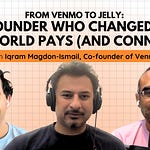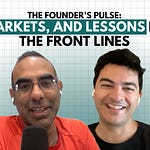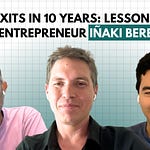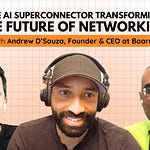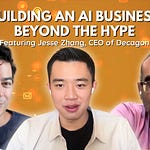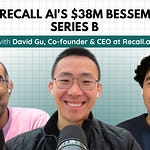Want to join the conversation? Connect with us on Tribe.
Find “Founders in Arms” on Apple Podcasts, Spotify, and YouTube.
Transcript of our conversation with Sam Chaudhary:
00:00:00:00 - 00:00:16:15
One way of looking at school. The institution of school is that it's really just like a bundle of jobs that are offered to you as a parent to be done for your kids, right, or offered to your kids so those jobs can be teach my kid to read. It could be teach them math in whatever way the school is teaching math.
00:00:16:20 - 00:00:38:15
It can be helped. Build some self-esteem and confidence. Help them make some friends. Whatever. Whatever. Whatever. You know, my contention is that schools try really hard to do all these jobs equally well for all kids, and it's a completely impossible task. Like, there's no way that any school can do every one of these jobs at a very high level for every single kid with all their different hopes and dreams and circumstances and inclinations and so on.
00:00:38:16 - 00:00:56:05
So my view is like, actually like some of these jobs ought to be done better outside of school. We can complement school with or, you know, in some cases you might want to substitute parts of school with far better, ways of doing things for your kids. Like if the main feedback loop kids were getting is whatever the school puts in front of them, then, you know, that's what kids are going to respond to.
00:00:56:06 - 00:01:12:08
And so then we can start to introduce other, other ways for kids to get positive feedback. I keep just stressing the point, that dojo is a small pond, and it's very different to be in a big pond, right? When you're a small pond, all that matters is the growth rate of the pond, because if the pond grows, it's going to be strictly better for you.
00:01:12:08 - 00:01:16:08
And every dimensioned learning purpose, network, etc., etc..
00:01:20:04 - 00:01:24:21
Hi, everyone. Welcome to Founders in Arms with me Immad Akhund co-founder and CEO of Mercury.
00:01:25:03 - 00:01:48:16
And I'm Raj Suri, co-founder of Lima and Tribe. And today we have with us Sam Chaudhary, the co-founder and CEO of Class Dojo. Class dojo is used by over 50 million students in over 180 countries. Sam, welcome to the show. You and I have known each other probably for the most of. And I've known anyone in Silicon Valley, you know, over maybe almost 30 year.
00:01:48:17 - 00:01:52:21
I don't even know it's something like that. Right? Since elementary school.
00:01:53:07 - 00:01:55:10
Why did you go to the same elementary school?
00:01:55:21 - 00:01:58:07
I turned it. Yeah. I think it was middle school for me.
00:01:58:07 - 00:01:59:19
Zoom, but. Yeah, for
00:01:59:19 - 00:02:01:19
probably from about age 13 or so.
00:02:01:19 - 00:02:02:19
It's. Yeah. Age 13
00:02:03:19 - 00:02:05:07
from Abu Dhabi.
00:02:05:07 - 00:02:07:19
Oh, really? Oh, that's a random.
00:02:07:19 - 00:02:13:19
It's.
00:02:13:19 - 00:02:18:19
you keep up all that time? Or, like, you kind of reconnected in the startup world?
00:02:19:08 - 00:02:24:07
We connected. I think we reconnected. Yeah. Who is he picking me when he went to Cambridge? Is that right?
00:02:26:11 - 00:02:27:19
Yeah.
00:02:27:19 - 00:02:31:19
when you were just doing wiki or just finished wiki or something
00:02:33:23 - 00:02:34:07
Did
00:02:34:07 - 00:02:38:19
you. Did you both know you'll be entrepreneurs back then, or you had no idea?
00:02:39:04 - 00:02:40:19
I didn't know.
00:02:40:19 - 00:02:42:15
What did you think you would do?
00:02:42:19 - 00:02:44:23
I thought I was going to be a doctor, you know, because my parents
00:02:44:23 - 00:02:46:11
Oh, yeah. Yeah.
00:02:46:11 - 00:02:48:11
Veterans like Doug to go.
00:02:50:23 - 00:02:52:11
Home. Yeah. How many
00:02:52:11 - 00:02:56:23
years were you a disappointment for your parents? Roger.
00:02:57:03 - 00:02:58:15
Yeah, I probably still am, you
00:03:00:08 - 00:03:00:23
It's not too
00:03:00:23 - 00:03:02:11
late.
00:03:02:11 - 00:03:07:11
like at some point you get, like, some media coverage and that parents like, oh, maybe he's, like, not going to die in the street, so
00:03:07:11 - 00:03:08:11
I can. I can,
00:03:08:11 - 00:03:09:23
yeah. Yeah.
00:03:09:23 - 00:03:18:05
Yeah, I didn't have I had, like, very weird obsessions. I had like, these phases of obsession. Like, I remember I was a, a bit younger.
00:03:18:06 - 00:03:22:11
I was maybe 8 or 9. I got really into dinosaurs for like, a year, and it was
00:03:22:11 - 00:03:23:23
just, like, the only thing that mattered to me.
00:03:23:23 - 00:03:31:09
And I went super deep at it. All kinds of like projects on a that I had one on space. I got very deep on that. And so I did like a series of obsessions.
00:03:31:11 - 00:03:39:23
And when I got to college, I assumed I was just going to like, be like, a mathematician, an economist. And yeah, I thought I'd just continue with that.
00:03:39:23 - 00:03:41:23
What changed? That's a big change.
00:03:41:23 - 00:03:49:12
yeah, this is a big change. Well, you know, I think, I mean, you know that. So the school we went to was kind of an odd school in a lot of different ways.
00:03:49:14 - 00:03:57:23
But one of the ways it was odd, which I hadn't appreciated at the time, was the really insisted on kids teaching as well as learning.
00:03:58:23 - 00:04:00:11
Yeah. Yeah, it was, it was a.
00:04:01:23 - 00:04:10:13
Year younger kids like all of it. So I think many of us you probably did this as well, but many of us ended up teaching for like a good amount of time there.
00:04:10:14 - 00:04:11:12
This is like, after
00:04:11:12 - 00:04:14:11
Yeah. We were forced to. You didn't have a choice.
00:04:17:14 - 00:04:22:11
Is this the way to, like, reduce teacher salaries? That just like half the teaching is done by students.
00:04:22:15 - 00:04:29:23
Well, you know, well, at the time, it was just it was one of those things. It was just a normal in a way. Like I didn't I didn't realize at the time that it wasn't like a normal thing.
00:04:29:23 - 00:04:31:11
And like, I was just, like teaching a
00:04:31:11 - 00:04:38:09
bunch and, you know, you were in that environment and I got to college and yeah, I thought I was going to do a PhD.
00:04:38:11 - 00:04:53:17
And then one of my professors was like, hey, I know you did that. We are teaching thing at your school. A friend of mine's, needs some help at his school. Would you go help him out? And so I end up going to this very nice, old school in the UK and helping them out for, like, a little bit, with their economics math department.
00:04:53:19 - 00:04:58:23
But all the conventional things you're supposed to do, like, you know, you supposed to going to be a consultant or a banker or whatever.
00:04:58:23 - 00:05:00:11
I'd kind of. And McKinsey
00:05:00:11 - 00:05:12:07
had come back around and they were starting an education group. And they were like, look, you're into education stuff. Do you want to, you know, basically talk to a bunch of education ministers and get to understand public education systems.
00:05:12:07 - 00:05:15:23
And at age 20, that sounded just like intoxicate.
00:05:15:23 - 00:05:17:11
I don't think McKinsey
00:05:17:11 - 00:05:20:11
had very much value in those discussions. But, you know, I
00:05:20:11 - 00:05:21:23
got to learn a lot,
00:05:21:23 - 00:05:33:20
right? And then I left and, I while I was McKinsey, I met a couple of friends, who were at Oxford Entrepreneurs, and they were like, hey, do you know about this Hacker News thing?
00:05:33:22 - 00:05:39:14
And I was like, no, what's that? And we started getting really into reading Hacker News together. There's like a small group of people in London that were really into following.
00:05:40:13 - 00:05:42:11
Where is this 2006?
00:05:42:11 - 00:05:47:10
It was a I think it was to a little later as I 2009, maybe eight, nine
00:05:47:10 - 00:06:05:04
Okay. Just. Just after my time. But the Oxford entrepreneurs were, were a great bunch. That's that's partly how I moved to San Francisco because, you know, there was there was a group there and every, you know, there's like basically 3 or 4 Oxford entrepreneurs that ended up moving, to do Y Combinator.
00:06:05:06 - 00:06:10:11
And I was like, okay, I should just do this. And I mean, there were there were like a real inspiration.
00:06:10:14 - 00:06:25:04
Exactly the same. So I met had met a bunch of these guys, and we fell in together and we were like, oh, I guess we're we're going to, you know, dive into into starting something that could have some impact to the world. Like, I think it just opened an aperture of, oh, you can you don't have to just take a job.
00:06:25:04 - 00:06:26:11
You can go and build things. And
00:06:26:11 - 00:06:29:11
Did you actually do Y Combinator?
00:06:29:11 - 00:06:41:23
So what we were applying to, I see my co-founder was emailing with PG actually, because he would write back, back in the day very quickly. But but, they just started an education incubator, like on the side called imagine.
00:06:41:23 - 00:06:43:11
Yeah.
00:06:43:11 - 00:06:45:05
Ralston and Tim Reid and a few others.
00:06:45:10 - 00:07:02:14
And so we were like, oh my God. Like, you know, we we want to do an education idea. And this was like the perfect moment where like, okay, well, everything's kind of, colliding here. I think like a year or two later that rolled back into wiki and, you know, so now I think officially we're like a wiki summer or 2012 or something.
00:07:02:14 - 00:07:02:21
Company.
00:07:03:14 - 00:07:04:23
Oh, cool. So you did that.
00:07:05:22 - 00:07:09:23
And do you guys know each other? Do you guys know before this podcast?
00:07:10:02 - 00:07:11:23
I think maybe we've met once,
00:07:11:23 - 00:07:13:11
but not well. I think we're on
00:07:13:11 - 00:07:15:11
the same WhatsApp channels.
00:07:19:11 - 00:07:20:11
Ron.
00:07:20:17 - 00:07:21:06
Yeah.
00:07:21:06 - 00:07:25:23
Or the UK ones? Are you in? Are you in the Bay area?
00:07:25:23 - 00:07:27:23
Yeah.
00:07:27:23 - 00:07:29:23
No. Nice. Where
00:07:29:23 - 00:07:32:23
are you? Are you like next door?
00:07:35:14 - 00:07:40:11
it's it's weird. It's, So, like, we we did the incubator, and then we moved up to this to San Francisco.
00:07:40:11 - 00:07:41:23
Like I say, we me and
00:07:41:23 - 00:07:46:23
my co-founder. And we lived in this startup apartment in the mission.
00:07:46:23 - 00:07:48:11
I think this is very classic
00:07:48:11 - 00:07:52:14
on a story. We found this, like, two bedroom place there, and we lived there for ages together.
00:07:52:14 - 00:08:01:22
I think like 6 or 7 years were living there together, working together every day at the office. He moved out. I stayed there just out of stubbornness until basically the end of last
00:08:02:19 - 00:08:03:23
Oh wow.
00:08:03:23 - 00:08:05:11
You've been in the same office
00:08:05:11 - 00:08:06:23
for 13 years.
00:08:06:23 - 00:08:08:11
Okay. But
00:08:08:11 - 00:08:12:23
with the other, we
00:08:12:23 - 00:08:14:20
always had to move out, but the same house.
00:08:14:20 - 00:08:15:11
And then,
00:08:15:11 - 00:08:16:23
Yeah, we just
00:08:16:23 - 00:08:18:23
I mean, it was fine. Like
00:08:18:23 - 00:08:20:11
I said, we're very we're very grateful
00:08:20:11 - 00:08:29:22
for it. But in reality, the reason we chose it was one of our first engineers was as an engineer, Stanford kid. It was like before we moved to the city, he was like, guys, I'm going to show you an amazing time.
00:08:30:03 - 00:08:32:23
You have to come to this place called the Elbow Room.
00:08:33:05 - 00:08:34:23
Okay. Yeah.
00:08:34:23 - 00:08:43:06
we were like, this is this is the center of my life. Turns out in the city. So in our 20s, we're like, we've got to be near the elbow room. So we just picked this apartment near the elbow room, and it turned out to be a good bet.
00:08:43:06 - 00:08:44:11
But, yeah.
00:08:45:00 - 00:08:45:23
I mean, I guess you
00:08:45:23 - 00:08:48:11
were locked into some cheap, cheap rent as well.
00:08:50:11 - 00:08:51:11
Yeah.
00:08:51:11 - 00:08:52:23
So it's a real,
00:08:52:23 - 00:09:07:11
You've done this for almost 14 years. Like, Yeah, that's a long journey. I did my previous startup for eight years, and it felt like an eternity. So, like, how have you kept, like, motivated and engaged? Like how how has that been for you?
00:09:07:15 - 00:09:10:23
Yeah, it's a good question. I think this it comes in kind of, waves.
00:09:10:23 - 00:09:12:11
Honestly, I think
00:09:12:11 - 00:09:28:10
so. We picked a very strange, I think it's important for us, but strange, strategy, honestly, from the start. So, you know, we had this enormous mission that we want to give every kid an education they love. And then you get into what's the first step that you can actually take?
00:09:28:12 - 00:09:40:11
And very early on at the incubator, we run into Reed Hoffman. And we've been talking with him about this idea of reaching kids at scale. And I don't know if you guys know this, but education companies generally don't seem to be very successful. They don't
00:09:41:11 - 00:09:42:23
It. It's like a tar
00:09:42:23 - 00:09:43:23
pit idea, right?
00:09:43:23 - 00:09:44:23
It's like, don't do
00:09:44:23 - 00:09:46:11
education
00:09:46:11 - 00:09:47:09
Everyone's like, don't do this.
00:09:47:09 - 00:10:04:11
And we we had the same thing when we moved here. We're like, and this is like this seems like a like a hard bad industry. But you look a bit harder at it. And basically most people have take except for one company which you'll know, which is Duolingo. Most companies are retaking the same approach, which is they turn up at schools and they just like sell stuff to schools.
00:10:04:13 - 00:10:21:23
And there's lots of problems with this that we can get into, but it really prevents you from getting to scale very quickly. So our view is, well, we need to we need to do something different to that. We are in fact going to serve the real customers of education. We're going to serve parents. And that from day one when we're going to be a consumer company.
00:10:22:02 - 00:10:23:11
But we ran into Reed Hoffman early
00:10:23:11 - 00:10:26:23
on. He was like, well, this is great. You're going to build a consumer company. You need to find a way to grow.
00:10:26:23 - 00:10:28:11
You need to find a way to grow to to reach
00:10:28:11 - 00:10:35:23
consumers at scale without paying for every single user. And you know, Reed, being Mr. Network was like, it'd be best if you build some kind of network.
00:10:37:11 - 00:10:50:14
about that early on. And that became the only goal was like, look, if we can it was kind of like a binary bet, right? Like if we can establish a network that reaches the demographic kids and families at scale, then we'll have a lot of time to build great businesses on it.
00:10:50:14 - 00:11:07:02
But if we can't build a network, then none of it will really matter. Like you might be better off just starting the school if you wanted to have impact on education, that small scale, so scale really matter, right? And so, so we basically spent the first seven ish years of the company only focused on building that network to reach scale.
00:11:07:04 - 00:11:10:23
So we only actually started monetizing about 4 or 5 years ago. So it's been a
00:11:10:23 - 00:11:17:13
Oh! No way. And you would just raised enough money to get to that level.
00:11:17:13 - 00:11:31:19
well, one, we raised money for sure, but every time we turned up to fundraise, we could basically just show growing user base and engagement and retention metrics. The other side of the deal, though, is that we were going to be extremely frugal.
00:11:31:23 - 00:11:33:11
So we got to 2019,
00:11:33:11 - 00:11:52:08
which was like seven years in and we were like 30 people. So on paper you'd be like, oh my God, this thing isn't growing right? But we are serving millions of millions of kids. And the other thing was, we had committed to not spending a dollar on user acquisition. So all of our all the growth we'd had was entirely through word of mouth and network effects and the things we can get into.
00:11:52:09 - 00:11:56:11
But it's still true to this day. We still haven't spent a dollar on on user acquisition.
00:11:57:09 - 00:12:11:07
I have so many questions there. So how do you, like, let's say, you know, you get into 2025 planning and you want to say, like, we're going to go with this. Much like, how do you predict your growth if it's like or like an a word of mouth? And, I mean, Mercury has this issue as well.
00:12:11:07 - 00:12:20:21
Actually, we we are very worried about driven. But yeah, it's always tricky to say like, this is the predictable business when it's like grown like the.
00:12:20:21 - 00:12:35:08
I think. So we've we've had a few different effects. Right. So there's pure word of mouth which you'll just hear about it and tell their friends about it. But the thing that I think is interesting for us is, we grow through schools, right? So for those that don't know what class I drew, is it started as a communication app.
00:12:35:10 - 00:12:55:22
Teachers would pick it up for free individual teachers in other school, and then they would spread it to to kids and families. And the function that the value had served was it started to create these classroom communities. So these small closed groups where people could share pictures and videos and moments and messages. And so it really kind of turned the classroom into this, like, like little, little village again.
00:12:56:00 - 00:12:59:23
And that became very exciting for people. And then that would spread through schools.
00:12:59:23 - 00:13:01:11
So it's a bit like if
00:13:01:11 - 00:13:07:23
you're a manager of your slack, you have some view into what the growth dynamics look like. Once you land in an organization,
00:13:07:23 - 00:13:09:11
you know that you get one team
00:13:09:11 - 00:13:12:15
activated. Then over a certain period of time, months here, years.
00:13:12:19 - 00:13:25:23
This is generally what growth curves look like. So you can actually look at these cohorts on dojo going back at a school level and just see how we've landed and expanded through schools. So you get a little bit of predictability, a little more predictability. Beyond just pure word of mouth.
00:13:26:20 - 00:13:48:21
I guess the other logic to this space is like. Okay, you know, firstly, it's annoying to, like, sell because you have to sell to the governments and these educational institutions. And then secondly, if you don't sell to them, like parents don't have what, like generally, I mean, obviously these rich parents are willing to spend on education, but generally their parents don't have money that they're willing to spend on education.
00:13:48:21 - 00:13:56:23
So like, I guess, like, you know, seven years and you're thinking about monetizing, like, how do you monetize it? You know, once you build this network.
00:13:57:01 - 00:14:03:23
Yeah. So that was actually, if you think of, like, the hard things that you have to do, then it's hard things in every company. The first hard
00:14:03:23 - 00:14:05:11
thing was, how do we
00:14:05:11 - 00:14:12:15
figure out distribution here in a, in a world where, you know, none of these companies reach billions of people or, you know, just like on a user base basis.
00:14:12:15 - 00:14:33:15
So that was the first hard thing you've pointed to. The second hard thing, which is like, none of these companies reach billions or tens of billions in revenue either. So how do you build an at scale business here? And, you know, everyone throws around the number. If I know 5 or 6% of GDP is spent on the education system and so and so, but that's actually like not a great way to look at the market because you're basically pricing in lots of salaries and staff and this kind of stuff.
00:14:33:15 - 00:14:46:11
Right. But the thing that we maybe, maybe then I'll say on this is I think a lot of companies have to have some kind of belief, especially consumer companies, some kind of insider belief that you believe that everyone else is missed.
00:14:46:11 - 00:14:47:23
And we weren't sure about
00:14:47:23 - 00:14:54:17
this at the start, but our belief was that, like all parents care about their kids, it's an evolutionary imperative for you to care about your kid.
00:14:54:19 - 00:15:10:21
And we think that if we can give you the right products, you will actually spend money on them for your kids. So actually, I spoke with someone at Spotify about this a while ago. They had a really interesting, way of thinking about it, which is a parallel for me. They're like, look, if you try to price, or size the market for music.
00:15:10:21 - 00:15:14:23
When Spotify started, you might look at the number of CDs that were sold.
00:15:14:23 - 00:15:16:11
And, well, it's 100 million
00:15:16:11 - 00:15:28:13
CDs. It's eight bucks a CD. So the whole market for music is like $1 billion, and it's like way too small. But then if you reason it from first principles, you're like, well, hold on. Every society in history has evolved music in some way.
00:15:28:15 - 00:15:37:23
And it's in the top five interest of basically everybody in the world at some stage in life. So it might be that this isn't a market problem, but it's actually a product and packaging problem.
00:15:37:23 - 00:15:39:11
And what we presented here is
00:15:39:11 - 00:15:44:13
the most compelling product in the most compelling packaging. And that was we didn't have these like good words for it at the time.
00:15:44:13 - 00:16:03:03
But those basically the bet we were making with Delta was that, well, actually, we think families at all income levels really care about their kids. But the problem is the supply curve for education is basically this. Like we have a 90 degree angle where you pay $0 at the point of use. If you're in public school, and then you pay 50 K, or if you want to use to send your kid to private school.
00:16:03:08 - 00:16:17:20
And you know, there's a few things in between like apps and yada, yada yada, but there's nothing that, as a parent, you can point to and say, that is the brand that I trust with my kids in the way that you might point to Disney and say, I trust that this is going to be entertaining for my kids or on Lego and say, this is going to help them play.
00:16:17:22 - 00:16:37:22
And we were like, look, we think we could build a brand that has many products in it that parents can trust, and that they would be willing to spend money on. And so that that was like the big picture. Now the brass tacks of it. And when we got to 2019, we're like, oh, well, you know, we've actually got some substantial user base now, I forget what it was, but it was definitely like in the millions of kids, you know.
00:16:37:22 - 00:16:38:11
And
00:16:38:11 - 00:16:39:11
so it's a pretty substantial
00:16:39:11 - 00:16:40:23
chunk of kids in
00:16:40:23 - 00:16:42:11
the US and families.
00:16:42:11 - 00:16:59:23
And we were like, well, let's let's start, serving some of the needs that we'd heard from families over time. So the first one we built was actually very trivial. It was a subscription for families called plus and plus really just gave them a handful of, additional features that made the
00:16:59:23 - 00:17:01:11
communication a slightly better.
00:17:01:11 - 00:17:13:13
And so we so we launched that. Honestly, it took us by surprise how well that works, that just start to scale really nicely. And, you know, basically funds the entire business, on its own. But that was our first revenue stream. So I'll
00:17:15:06 - 00:17:31:06
Well, I'm curious about that. Plus, how did you acquire customers for that? Like. Now, as a parent, I don't know about you, am I? But I think about these things all the time and, like, products for parents. And it's really interesting what you just said about, you know, parents are, you know, like the, the curve and like, there's only two options.
00:17:31:06 - 00:17:32:23
There's like a, you know, private school,
00:17:32:23 - 00:17:50:23
I kind of wish my school, my the school. My kids go to use class dojo. Right? Like the. Like the. Yeah. You know, I like you guys. You guys need to still distribute because, like, it sounds useful that you have, like, a strong kind of communication app with, like, teachers, like, right now. Like, they just send us emails.
00:17:51:01 - 00:17:52:11
It seems so limited.
00:17:52:11 - 00:17:55:23
right. Well, what? We'll. I'll find out some details afterward. We'll get to work on it.
00:17:56:09 - 00:18:03:23
Yeah. But how did you acquire these these parents like. Because if you're if you're going to parent, that's probably the heart. The schools you can find them. Right. They're they're probably easy directories and stuff. But
00:18:03:23 - 00:18:07:11
parents had.
00:18:07:11 - 00:18:11:11
Yeah. So the communication hub kind of brought in a huge. Like, every
00:18:11:11 - 00:18:12:23
I see okay.
00:18:12:23 - 00:18:16:14
parents and 30 kids. And so they kind of create this huge, community.
00:18:17:07 - 00:18:21:23
But but the teacher would have to initiate it. Who initiated the like? The network.
00:18:21:23 - 00:18:26:23
Yeah. Great. Great questions. In the early days, it was definitely the teacher still probably mostly teachers today.
00:18:26:23 - 00:18:28:11
What we started to see, though,
00:18:28:11 - 00:18:35:11
is that, we started in this narrow use case. Right. Like, let's connect you to what's happening in your kid's classroom.
00:18:35:11 - 00:18:36:23
Very useful for a lot of
00:18:36:23 - 00:18:44:00
parents. You know, you might be used to getting a parent teacher conference once every four months or something and then getting some nasty surprise of, like, what happened?
00:18:44:00 - 00:18:48:23
And, you know, it's it's kind of very like as with so many things about the education system, it's super outdated.
00:18:48:23 - 00:18:50:11
So we were like,
00:18:50:11 - 00:18:52:23
well, can we just move that to continuous sharing?
00:18:52:23 - 00:18:54:11
So the sharing kind
00:18:54:11 - 00:19:00:14
of started with teachers. Now what we're finding is parents actually want that same thing in many other aspects of their kids life, right?
00:19:00:17 - 00:19:03:11
Their kids are in many groups, afterschool clubs and summer camps and
00:19:04:23 - 00:19:09:11
so on and so on. So I think we're starting to move into more and more of these groups, some of which are parent initiated.
00:19:11:07 - 00:19:27:23
I think one interesting thing you said, which is like, with, stepping back and realizing is like, you know, often when you look at a market, it seems small, but like the, the bit that's missing is a product or packaging that, like, completely changes the market dynamic.
00:19:27:23 - 00:19:29:11
I mean, Mercury, obviously
00:19:29:11 - 00:19:37:03
banking is a huge market. But you know, often when I was first pitching Mercury, people are like, oh, people don't care about like picking a bank, right?
00:19:37:03 - 00:19:37:11
Like
00:19:37:11 - 00:19:38:23
it's like very retentive.
00:19:38:23 - 00:20:03:15
I'm like, yeah, they don't care because it will suck, right? Like obviously like if you have a CEO of sucking, no one's going to pick like, something good, right? I was I was like, okay, we're just going to make something great. And then people will actually pick it. And, you know, it seems obvious in hindsight, I guess, but but people really did not believe it that like, actually the, like the thing that was missing was the product that would, like create the market in its way or create like a movement.
00:20:03:17 - 00:20:18:23
But like often the biggest successes are like that. Like you have to like the market kind of like doesn't exist because the product doesn't exist and like, and but it's confusing from like a, you know, outside VC perspective or like an outside analysis perspective. It doesn't make any sense.
00:20:18:23 - 00:20:26:17
Products change markets like people do understand that it's such a fundamental truth in startups which entrepreneurs I think fundamentally understand. But
00:20:27:06 - 00:20:37:11
But sometimes they don't. Right. Like I think the, the, the lack of product market fit as an a product does not change market. So like it is the hard bit of like you, you imagining a change that doesn't exist yet.
00:20:37:11 - 00:20:38:23
But one way
00:20:38:23 - 00:20:44:11
I think about it. So one way I think about it is like we're a proxies for spend or proxies for time. Right. So
00:20:44:11 - 00:20:45:23
it in,
00:20:45:23 - 00:20:55:04
in the education space and also as Sam mentioned, like it's an evolutionary trade for parents to want to educate their kids. It's like a, it's like a deep seated need.
00:20:55:06 - 00:20:55:11
And
00:20:55:11 - 00:20:56:23
so, you know, the
00:20:56:23 - 00:21:14:02
drive is there. The budgets are already there because people are spending time and money on education. So you can see that there's there's something there. Right. There's something in that space that, that you can drive. Same with banking. It's like, look, people are still spending time with their banks, spending money on banks. So there's a big pocket there that is exists.
00:21:14:02 - 00:21:31:15
I think that's exactly right. Yeah. I mean, Emma, just what you were saying. I think there is something to these industries that people have assumed are kind of fixed, where you start to actually serve people as real consumers, and you actually respond to, like, real consumer needs, that that really changes the dynamics. So I'll give you an example.
00:21:31:17 - 00:21:38:16
We launched our second business. We launched a couple years ago. It was called Dojo Teaser. And the need we heard from parents,
00:21:38:16 - 00:21:40:04
they'd get these spikes of
00:21:40:04 - 00:21:48:00
anxiety, they'd go to a parent teacher conference, or they they'd go to back to school time and they'd realize the kids are really struggling with something. Maths, reading, whatever it is.
00:21:48:02 - 00:22:07:20
And they're like, oh my God, what do I do? And you know, for the parents who have the time and inclination, they start searching for apps and trying to find something that they trust. Trying to find like a coach or a tutor to help their kid, or some extra classes, you know, that that, but that that has always been kind of reserved for people that could afford that.
00:22:07:22 - 00:22:25:15
So on dojo, we launched this service called tutor, which connects families with teachers, both of whom already in our, in our network. And so we don't have any user acquisition costs there, which makes allows us to have far better pricing. The better pricing allows us to access customers who have never paid for a tutor for their kids before.
00:22:25:17 - 00:22:30:04
And, you know, we pulled recently our base that's paying for tutor. It's it's a
00:22:30:04 - 00:22:31:16
marketplace. Three out of
00:22:31:16 - 00:22:45:16
four people had never paid for a tutor before because they considered it out of reach. And I'm like, you know, there's a lot of stuff we're going to do with AI around that as well to make it even cheaper, but that's like amazing that just, like massively expands the market away from, like, neurotic parents or probably our parents.
00:22:45:16 - 00:22:48:16
Yeah. To to like to people that the want this.
00:22:49:07 - 00:23:08:15
You know, I think, the the the whole space is somewhat underserved. Even you agree? Companies like Class Dojo. I think parents are willing to spend a lot more on on, kids products. You know, there's obviously a huge universe of toys and stuff like that, but, like, I think you know it, this whole the AI toys is going to be a very interesting area to, you know,
00:23:08:15 - 00:23:31:08
But I mean, Sam has spent 14 years to get to this level. Right? Like, if you were advising another entrepreneur, that's like thinking about edtech, would you say like, hey, it is a tough idea. Unless you could cover for like 14 years and build a network and like, do all these things. Or do you think it is like there's a ton of, like, actually like interesting ideas here and people just not not enough entrepreneurs.
00:23:31:08 - 00:23:32:03
Do you?
00:23:32:03 - 00:23:37:03
I think there's lots of interesting ideas, but I think the challenge for a lot of people is how do you how do you build a meaningful business? How do you
00:23:37:03 - 00:23:38:15
achieve some scale. Right. And so
00:23:38:15 - 00:23:45:11
I think that's still. Yeah, it was I think about like second time founders build distribution, first run building the product first thing.
00:23:45:13 - 00:24:03:16
And then there was something about figuring out how you're going to distribute at scale. Our answer when we started was we had the tailwind of smartphone adoption. And 2012 was amazing. Time to launch a communication app because you could get that installed. And, you know, like now lots of people have it. And that gives us like a great moat to to, to start with.
00:24:03:16 - 00:24:04:03
So,
00:24:04:03 - 00:24:05:15
you know, when we
00:24:05:15 - 00:24:20:06
launch a product it goes to very large scale very quickly. Right. I think today's answer for distribution might have to look different. Right. Like, I don't know if it's if there's a lot of new apps people are installing on their phones all the time, especially in consumer categories. Maybe there are.
00:24:20:06 - 00:24:36:15
I'm not familiar. You know, we've seen ChatGPT, you know, capture the imagination, but that's, you know, do you build like a 10 or 100 x better product that people just install for themselves? And that gives you distribution? The good news is, like, you can actually build 10 or 100 x better product experiences today. If
00:24:36:15 - 00:24:38:03
you want to teach your kid to read like
00:24:38:03 - 00:24:42:17
five years ago through some kind of app, it would be kind of not that great as an experience.
00:24:42:19 - 00:24:55:15
And now you can build, you know, really magical feeling products. Arguably everybody can build a magical feeling for X, so you still have to solve that problem. But I think distribution is still the thing to figure out in education. And.
00:24:56:07 - 00:25:06:15
Yeah, I there's actually, Grimes. You know, Elon's ex came up with this, like, a AI toy, right? For for kids. Like, it's like an AI friend.
00:25:06:15 - 00:25:08:03
Yeah, yeah, yeah, it's a very
00:25:08:03 - 00:25:16:17
interesting one that, like, basically, it's like a robot in your in your home that the kids can talk to, with AI, but, you know, basically it's an AI toy.
00:25:16:18 - 00:25:32:15
I think there's going to be a lot more of those types of interesting, concepts. But yeah, I mean, I mean, distribution is a big what, what other companies, have have like successfully distributed to this like parent kids market, at tech over the last 15 years. Sam, I mean, you probably know the space inside out.
00:25:32:20 - 00:25:38:03
Yeah. Good question. I mean, I feel like, Duolingo has done, like, a nice job in the mass consumer market.
00:25:38:03 - 00:25:39:15
They started to get into
00:25:39:15 - 00:25:43:03
working with younger kids and families, too. I don't think it's a focus for them.
00:25:43:03 - 00:25:44:15
In a weird way,
00:25:44:15 - 00:25:47:03
Roblox has done an amazing job
00:25:47:03 - 00:25:48:03
with the same
00:25:48:03 - 00:25:49:03
demographic.
00:25:49:03 - 00:25:50:15
And there's I think there's lots of
00:25:50:15 - 00:25:52:13
privacy concerns and all that kind of stuff.
00:25:52:13 - 00:25:54:15
It's not it doesn't feel great to parents.
00:25:54:15 - 00:25:55:15
But,
00:25:56:10 - 00:25:57:03
I mean, there's
00:25:57:03 - 00:26:00:15
very little educational material in Roblox.
00:26:00:15 - 00:26:01:15
It's the reverse
00:26:01:15 - 00:26:03:03
education. Maybe.
00:26:03:03 - 00:26:10:03
hard. Yeah. I mean, like, that's kind of the challenge, right? You've got a lot of companies which are giving kids ways to spend time online, but how
00:26:11:15 - 00:26:18:10
and you as a parent, ones are threading, threading the needle of kids love it and parents feel good about it is very small said.
00:26:18:12 - 00:26:26:15
You know, you can you can pull up other examples that YouTube kids and and so on and so on. But I don't think anyone would feel great about just leaving their kids in front of YouTube kids forever.
00:26:26:17 - 00:26:28:03
Oh no. Absolutely
00:26:28:03 - 00:26:29:15
not.
00:26:29:15 - 00:26:44:15
Yeah. You know, I, I've always been surprised that the iPad itself does not have like a dedicated kids mode, like, or there's not even, like a dedicated kids iPad that Apple sells, like you just packaged up their iPad, you know, as a like a kids product, like an iPad kids.
00:26:44:15 - 00:26:53:15
Like, even screen time is super annoying to use. Like, if you want to actually set it up. So it's, like, done properly. There's, like, it's actually just not that
00:26:53:15 - 00:26:55:03
easy to, like, put it in kids
00:26:55:03 - 00:26:57:03
mode for sure.
00:26:57:03 - 00:27:17:04
It's one of the things that bother I, you know, as, as I was ideating on my next step after, my last company, I mean, parent stuff, I mean, I as a parent now, like you have so many ideas around that, that topic and, you know, one of the, one of maybe the carpet ideas, is like this, like, how do you drive your kid to, like, you know, X activity, right?
00:27:17:04 - 00:27:25:03
And like, there's a lot of time parents spent driving their kid around. But I saw a tweet, actually, just a weekend, I think, from Google. Do you see this tweet that, like, people
00:27:25:03 - 00:27:26:03
the Waymo's.
00:27:26:03 - 00:27:27:15
Yeah. It's against
00:27:27:15 - 00:27:30:03
the Waymo. Terms and conditions. People
00:27:30:03 - 00:27:31:15
are risking, too. Yeah, but
00:27:31:15 - 00:27:34:03
Uber actually has an Uber teens, which,
00:27:34:03 - 00:27:35:15
is kind of cool. So you, like,
00:27:35:15 - 00:27:43:15
you literally give them, like, I have a 13 year old, so I can give her a lap, but honestly, I trust, driverless Waymo more. The new routines like,
00:27:43:15 - 00:27:45:03
I mean, I'd rather not
00:27:45:03 - 00:27:47:08
have a human involved.
00:27:47:10 - 00:28:05:03
But yeah, apparently lots of private schools have like Waymo drop offs happening, at scale. I think it's great. I think like actually it's, it's good for both sides. Like, you know, once you have a get old enough like they want to do a lot of things and it's like super annoying for parents to drive them around.
00:28:05:10 - 00:28:15:03
Yeah. Another idea that I've had one about set off you guys is like this. Basically, it's like this centralized AI database for parents.
00:28:15:03 - 00:28:16:15
Or, like centralized. I just like for
00:28:16:15 - 00:28:24:10
parents because. So here's, here's the thesis, right? It's like, we all know a lot about parenting, but we only know very narrowly. So, like, we only know our own kids, right?
00:28:24:10 - 00:28:28:03
So I have two kids. Am I has three kids. So if you have kids.
00:28:28:03 - 00:28:30:15
yet. That we're hopefully starting this year.
00:28:30:15 - 00:28:47:06
Okay. Sounds good. Yeah. So you know, but you only know about your two kids or whatever. Your your a few number of kids. But there's obviously billions of kids that people have had billions of experiences, you know, raising kids. But I even I spent a lot of time with them, but I don't know anything really about like his parenting experiences.
00:28:47:08 - 00:28:57:15
And it's hard for me to learn from him. So if there was a way to capture that learning in a centralized database, you know, with AI. So I could ask questions about, like how to become a better parent,
00:28:57:15 - 00:28:59:03
you know, and learn from everyone
00:28:59:03 - 00:29:04:17
versus just learning from my own experiences. I think that would be super valuable. That's that's a like a data problem.
00:29:04:17 - 00:29:20:15
But we don't have that data captured anywhere. The technology of AI is there. But like the you know, if you if if there was an incentive for all of us to share our parenting experiences with this AI, that they could get really smart and like, build like the best parent ever and like teach us all how to be better parents.
00:29:20:19 - 00:29:28:15
Interesting. Would you want it scoped to, people you trust? Or just like, the whole world? Like would you be? I want to know how your mindset or assuming you
00:29:30:19 - 00:29:31:03
Yeah. I
00:29:31:03 - 00:29:41:15
mean, I don't want to know about, like, the average parent. I want to know about the best parents. And I actually kind of, I kind of want to know after the kids are successful. So,
00:29:41:15 - 00:29:43:03
yeah, those
00:29:43:03 - 00:29:47:17
are the, is, you know, as to what drives kids. I heard you say her name.
00:29:49:00 - 00:29:50:03
Widgets as their
00:29:50:03 - 00:29:51:15
widgets. Key. Right? Yeah,
00:29:51:15 - 00:29:55:15
She wrote a book about how to raise kids. And she has two very successful kids, like
00:29:55:15 - 00:29:57:03
the CEO of YouTube
00:29:57:03 - 00:30:02:03
and the CEO of 23. And me, is a three who's what? It is a third kid.
00:30:02:03 - 00:30:06:03
Yeah. Just three girls. The third kid is a neuro neurologist.
00:30:06:03 - 00:30:13:15
Okay, whatever. She's anyway, she's a great person with, like, three great kids. So she wrote a book about parenting, which, I,
00:30:13:15 - 00:30:15:03
it's I recommend,
00:30:15:03 - 00:30:17:14
but yeah, I think that I think that is interesting.
00:30:17:14 - 00:30:41:12
I mean, there's also, like, the challenges of raising a kid change over time, right? It's like, how do you deal with technology now? Well, like, yeah, I think one of the annoying things about parenting is, yeah, there's this whole helicopter parenting right now, and, like, I'm very I tried to create independence among our kids, but it's like, it's a you get, like, a weird, kind of and a peer pressure to write them.
00:30:41:12 - 00:31:04:03
But, like, if everyone else is saying, like your kid should and walk to school, then you feel like weird being the one parent, like, so, like it's almost a movement around, like, being too protective around kids. So I think, I think there's some element of that as well. Like, how do you get a break, these kind of, weird social things that like, people stuck in with parenting.
00:31:05:02 - 00:31:15:03
Yeah. I think in general, the, the peer pressure thing is something I think about a lot, because I think it's it's so damaging for for kids when you're young to be in compared to everybody else in the world.
00:31:15:03 - 00:31:16:15
I mean, you think you need
00:31:16:15 - 00:31:21:19
space. I think of it as, like, these little cozy bubbles. I. There is some paper I read a while ago on this.
00:31:21:19 - 00:31:30:15
It was like, if you look at people that go on to be, successful later in life, there's like a disproportionate number, start in smaller settings, smaller villages, smaller towns or
00:31:30:15 - 00:31:32:03
whatever. Yeah, I'll
00:31:32:03 - 00:31:38:09
try and dig it up. I might be butchering the takeaway, but but one, the thesis was that you just have time to develop some measure of self-esteem.
00:31:38:09 - 00:31:46:22
And like, there's real like biological and chemical processes that get affected when you have positive feedback loops. Right? You're like, you walk a little toward our you stand a little prouder because you would like the best
00:31:48:09 - 00:32:07:12
Yeah. Actually, this kind of ties into. I mean, you went to Cambridge. I went to Cambridge to, like when you go to Cambridge you're like like. Yeah, sorry, I, I was about to swear you're like, damn. Like I'm not that smart, right. Like, I remember, like, having, like, this opinion just because I was surrounded by people that I was often like number 1 or 2 in my math class or whatever.
00:32:07:14 - 00:32:31:05
And I was like, okay, you know, I must be pretty smart that I'm like, ahead. And then you go to Cambridge. I'm like, okay, you know, I'm happy. I'm happy. If I'm middle of this pack. Like that's really what it was like. I was like, okay, you know, I don't want to work this hard to like and to be honest, like a lot of people that go to Cambridge are like spending like 90% of their time, like working to try to, like, win that game still, but it is it is jarring.
00:32:31:05 - 00:32:37:15
And I think if you had that your whole life where you were being compared against everyone, you would you would probably have lower self-esteem for sure.
00:32:37:15 - 00:32:52:09
Yeah. I think one of the benefits is like, you get this progressive exposure, right? So you can start in, like, very small, cozy environment, and then you might be moved to, you know, a school or a setting which has a few other kids and then a few others and a few others. And maybe some point you end up in like a setting of ten people.
00:32:52:09 - 00:33:11:20
You're like, oh my God, this is like as much as I can handle. But I think the meta thing, though, for me, is the response, to adversity is probably ties to funding companies as well. Right? You know, there's a world where if you have the mind, let's say we all have. We all grew up with this mindset of, at some level, you get compared to other people, you compare yourself.
00:33:11:20 - 00:33:13:03
Everybody does it. It's kind of,
00:33:13:03 - 00:33:14:15
you know, everybody gets imposter
00:33:14:15 - 00:33:28:23
syndrome. All of us do. The next thing is like, what do you do about it? And, you know, I know, how can we equip kids with, early on in life? I think there's some people who are like, well, you're genetically this smart or genetically like this hard working and, like, that's it.
00:33:29:01 - 00:33:30:15
And so there's something wrong with you if
00:33:32:03 - 00:33:47:07
upset in this environment. And I think this is like a very damaging and limiting mindset to leave kids with. And I think the meta skill of, hey, like, turns out you can learn a lot of things. Turns out you can persist through hard things. Turns out you can follow your curiosity and find out what avenues work for you and which ones don't.
00:33:47:07 - 00:33:52:22
And it's not that there's something wrong with you. You're just finding your way in the world is like, I think it's great, liberating and freeing kind of mindset.
00:33:55:20 - 00:34:03:03
Yeah. No, it's so important. I mean, one of the problems I have with schools is that they, you know, degrade you on a very like sort of linear scale or in one
00:34:03:03 - 00:34:04:15
dimensional scale. And




